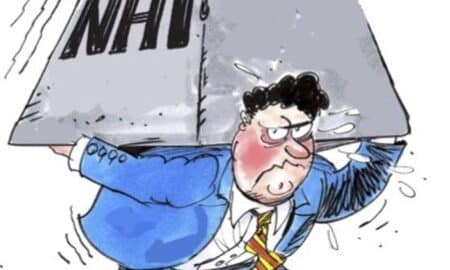In a Brenthurst Wealth research note published in April this year, the late economist Mike Schüssler pointed out that there were just 6.8 million taxpayers registered at the end of March. Various state welfare programmes, including public healthcare, are made possible by citizens’ taxes.
The more under pressure taxpayers are – either because of unforeseen local or global events, but also because of government’s chosen regulations and policies – the higher the possibility that people’s wealth will decline, or they will look to leave the country. Policies and regulations that destroy wealth and inhibit the creation thereof will have the ultimate downstream effect of further limiting those very services that the state believes it is best suited to provide.
In a recent presentation to Parliament, deputy director-general of health Dr Nicholas Crisp said that to fund its new National Health Insurance Scheme (NHI), government would eventually need to collect additional taxes.
These could take the form of an increase in VAT, a change in general taxation, and adding a payroll tax. The state’s finances are likely to become more constrained, given low growth for the next few years (hovering at just under 2%), and therefore lower tax revenues. The extra room afforded to the fiscus is also likely to be smaller, because the necessary improvements in infrastructure have not been done, and other countries will look for new places from which to satisfy their needs.
Despite caveats offered that government understands that it is highly unlikely that South Africa’s middle-class and wealthy taxpayers will pay more than they already do for private healthcare, these same citizens will always be a first port of call for a government desperate for votes, desperate to be seen to just be doing ‘something’. As long as its ideology demands that the ruling party must ‘provide’ for ‘the people’, it will attempt every possible avenue to obtain the necessary resources and control.
The NHI as proposed will not fix the many issues in the public sector. Most recently, Dr Tim De Maayer, a paediatrician at Rahima Moosa Mother and Child Hospital in Johannesburg, wrote an open letter addressed to Health Department heads. In the letter he detailed the problems affecting the hospital specifically, but also pointing to wider problems, “Children are dying and the horrendous conditions in our public hospitals are contributing to their deaths.” Dr De Maayer was subsequently suspended, apparently by the CEO of the hospital, after the publication of his letter, but was later reinstated and is back at work.
Dr Aayesha Soni, a medical doctor who has been working in the public healthcare sector for the past seven years, wrote a piece in support of what Dr De Maayer expressed in his letter. She concluded her piece by saying, “[Dr De Maayer’s] letter and the response to it have been the topic of discussion among doctors nationwide — and the message is clear: we are tired of not being able to properly serve the people of this country because of a broken system that offers us inadequate support. We can only hope it ignites action and true change which isn’t limited to lip service.”
Instead of aiming at high-level plans that contain the inherent risk of increasing taxes, adding yet more bureaucracy, increasing the costs of equipment, and possibly driving more of the country’s doctors, nurses, and other medical personnel out of the country, the government must shelve its NHI plans. Quality healthcare services are never a given; the requisite conditions to bring these about need to be in place. Should government proceed with its NHI goals, all South Africans will suffer from low-quality care options, and innovations and investment will dry up. Only those individuals with the necessary political connections and higher levels of wealth will be able to travel overseas to satisfy their healthcare needs.
Monopolising the management of all healthcare services in the hands of the state, as the NHI would require, will not solve any of the serious structural and management problems that plague South Africa’s private and public sectors. Government should rather focus on implementing the recommendations of the Health Market Inquiry, and further, on using its limited resources to improve the services that it provides for indigent citizens.
The NHI is the perfect example of misdiagnosing the symptoms of an illness, and consequently prescribing the incorrect medicine.
[Illustration: Colin Daniel]
If you like what you have just read, support the Daily Friend
Click here for a free 30-day trial with the CRA

